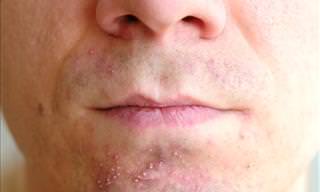1. Swelling
Swollen lips can be the result of a variety of conditions. Unless there is a likely explanation, you may be suffering from an allergic reaction to food or another substance. If accompanied by other symptoms like itchiness, pain or hives, visit your doctor immediately. Infections like the herpes simplex virus may also cause swelling of the lips. Though rare, medical conditions that cause pain and inflammation in other areas of the body (such as Crohn's disease) may cause swelling in the lips.
2. Cold Sores
Cold sores can be unpleasant. Caused by the herpes simplex virus, they're highly contagious. For the most part, the virus will remain dormant in your system, but it can flare up every now and then. Cold sores develop in the form of small blisters around the lips or mouth. It often starts with a tingling, itching or burning sensation. Certain triggers tend to activate the virus, including sunlight, fatigue, an injury to the mouth, and in women, menstruation. Cold sores aren't harmful, though they do signal that you may be run down, stressed or need to catch up on your sleep. They generally tend to clear within seven to 10 days without any treatment.
3. Tenderness
Tender lips are often accompanied by other symptoms such as cold sores or swelling, providing a good indication of what the underlying issue may be. If your lips feel sensitive to touch without other problems, it may be a mild allergic reaction, or sensitivity to something topical. Tenderness in the lips may be caused by lipsticks, glosses or balms. Toothpaste may also be a trigger.
4. Cracking Around the Mouth
Cracking at the corners of the mouth, also known as angular cheilitis, can be quite painful and can be caused by a variety of nutritional deficiencies. A lack of iron, for instance, means that skin cells are unable to regenerate as quickly, leading to broken skin. B complex vitamins also play a vital role when it comes to skin and lip health. Zinc is another important supporter of lip health - it is found in seafood, meat, nuts and speed, as well as spinach, cocoa, beans and mushrooms. Cracking at the corners of the mouth may also be due to too much vitamin A from supplements. For this reason, it is best acquired from rich food sources of beta-carotene like carrots, sweet potatoes, dark leafy greens, mango, melon and squash. Cracked lips may also be an indication of diabetes. The high level of blood glucose encourages the growth of candida, affecting the thin skin at the corners of the mouth.

5. Dryness and Chapping
These symptoms are usually caused by exposure to the elements, so use sunscreen to prevent this from happening. Dryness and chapping may also be caused by dehydration. Unless you experience no other symptoms, increase your fluid intake with water, coconut water or herbal teas. Dry lips may also indicate a lack of healthy, gut friendly bacteria. Improve the symptoms by adding fermented foods to your diet. Allergens in toothpaste or cosmetics may be another cause of dry, chapped lips.
6. Discoloration
Healthy lips should be pink or red in color. If your lips appear brown or bluish-gray, take note. Slightly blue lips indicate anemia (an iron deficiency) or a lack of oxygen in the blood. A flat brown or black spot on the lips, known as lentigo, may be due to long term sun exposure. Several types of medications may also cause discoloration of the skin and the lips, including certain antibiotics, chemotherapy drugs, some antidepressants and other drugs used for the treatment of skin disorders. Seek medical attention if the discoloration persists alongside other symptoms.
7. Pallor
Lips take on the hue of the underlying tissue color and blood flow. Consequently, pale lips can signal a change in the redness of the blood. It is affected by the oxygen levels in the body. Heart conditions and lung problem affect the amount of oxygen carried in the blood, as does anemia. Another culprit of pale lips may also be poor thyroid function.
8. Red Ring Around the Mouth
Also known as 'red aura' this ring is often caused by an allergy to foods like wheat, dairy, soy or the consumption of too many sodas (some people are sensitive to the benzoic acid that creates the fizziness in sodas). One of the best ways to remove the red ring around your lips is to clean up your diet.
What to Do for Healthy Lips:
Your lips should be pinkish, red and soft and smooth. If they aren't the following tips will ensure that your lips remain healthy:
1. Stay hydrated by drinking plenty of water throughout the day.
2. Address any nutritional deficiencies and food intolerances by eating a well-balanced diet.
3. Protect your lips from the elements by wearing sunscreen and lip balm.
4. Reduce stress and ensure that you are getting enough sleep to keep your immune system strong.
5. Use natural lip products and toothpaste.
If you do not see any improvement with the aforementioned tips, visit your doctor to determine the underlying issue.
 Go to BabaMail
Go to BabaMail
























































